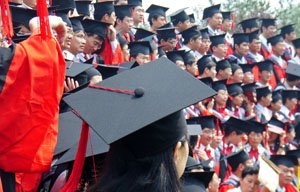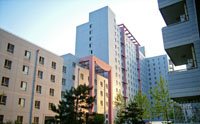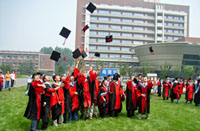Nanoscience, the Chinese way
As the first Danish nanotechnology students, Mikkel Marfelt and Jon von Bülow went to China to study for two months. The study visit to the country’s capital Beijing was a great cultural experience and led to some interesting research that proves that the technological development in China almost equals the best in the world.
Having travelled thousands of miles through Russia with the Trans-Siberian Railway, Mikkel Marfelt and Jon von Bülow on an april morning in 2007 arrived at the central train  station in Beijing. As the first Danish exchange students in China from the Nano-Science Center they knew very little about what they would be doing the following two months. They had organized the stay on their own, but what exactly their research at the University of Beijing would consist of had not been planned ahead of their arrival.
station in Beijing. As the first Danish exchange students in China from the Nano-Science Center they knew very little about what they would be doing the following two months. They had organized the stay on their own, but what exactly their research at the University of Beijing would consist of had not been planned ahead of their arrival.
“We took things as they came”, Mikkel Marfelt tells, and the two bachelors quickly realised that they really had nothing to worry about. They were picked up at the train station by a Chinese student and from there on everything – from the basic practical necessities to social life in the metropolis - were done to make their stay a success.
“They really did everything for us. Among other things we were included in the universities first team in both basketball, volleyball and badminton. And we were actually part of the winning team in a volleyball finale”, Mikkel Marfelt tells.
Both he and Jon had their research tailored to their academic background from Denmark. Mikkel worked on developing computer chips made out of plastic while Jon developed methods to producing plastic crystals.
 “I worked using methods developed by my advisor and was allowed to work very independently, even though many of the Chinese researchers in the research group worked on the basis of predetermined routines. It was very interesting to learn his techniques and I got some good results out of it – actually better than their own”, Mikkel explains.
“I worked using methods developed by my advisor and was allowed to work very independently, even though many of the Chinese researchers in the research group worked on the basis of predetermined routines. It was very interesting to learn his techniques and I got some good results out of it – actually better than their own”, Mikkel explains.
To a large extent the facilities at the university were similar to what the two students were used to from Copenhagen, although they were not always available due to high numbers of students.
This was also characteristic of life in Beijing in general. The city seems gigantic to a Dane, but at the same time it is just as modern as any big city in the western world.
“Beijing is overwhelmingly huge and so is the university. Their che mical institute alone is the size of the entire H.C. Ørsted Institute. But one really should not underestimate China. 200 million people live in what they call the high-economic zones, which are just as prosperous as in the west,” says Mikkel Marfelt, who believes Beijing in many ways is a perfect city for an international student:
mical institute alone is the size of the entire H.C. Ørsted Institute. But one really should not underestimate China. 200 million people live in what they call the high-economic zones, which are just as prosperous as in the west,” says Mikkel Marfelt, who believes Beijing in many ways is a perfect city for an international student:
“There are so many opportunities in Beijing where you can both emerge yourself in the Chinese culture and everyday life and spend time with some of the many other international students in the city if you need to talk to someone with a similar cultural background”
Mikkel decided to go to Beijing and not to another European country or to the United States because he wanted to experience something different and unusual – a decision he has not regretted the least.
“It was a huge experience and it is definitely not the last time I visit China. The country has an enormous potential and I am really fascinated with the culture. One in four citizens in the world is Chinese, so I feel I almost have to learn to understand their culture”, he tells.
